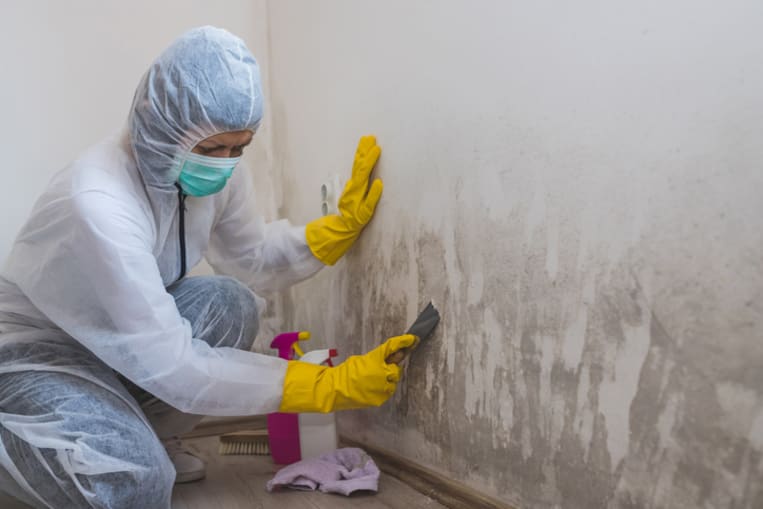
BBB Tip: Hiring a mold remediation specialist

(Getty Images)
Plumbing problems, leaky windows and roofs, poor insulation, and flood damage can all cause mold to grow. Not only does mold look and smell bad, but it can also cause serious health problems. If you notice mold in your home or office, you need to take immediate action to address it. These tips will help you find a trustworthy contractor who specializes in mold remediation.
When and how to hire a mold remediation specialist
- Determine if you can clean up the mold yourself. If a moldy area is less than 10 square feet in size, it will need Level 1 mold remediation. The EPA says that in most cases, you can handle Level 1 remediation yourself. You’ll need to fix any water problems, then scrub mold off hard surfaces with water and detergent. Make sure you wear the proper personal protective equipment while you clean. Dry the area completely. Keep in mind that some porous materials, such as carpet and ceiling tiles may need to be thrown out if they are moldy. You won’t be able to eliminate mold from these and similar porous materials. For more information, see the CDC’s recommendations for mold cleanup and remediation.
- Know when to hire a professional. If you are dealing with a lot of water damage, or the mold growth covers more than 10 square feet of space, it may be better to hire a professional. The same is true if you suspect your home or office has hidden mold that you can’t see. Investigating hidden mold requires caution, since uncovering the source of the mold could potentially lead to a release of mold spores that could contaminate the rest of the building.
- Decide if you need to hire an indoor air quality consultant first. If you can see or smell mold in a building, testing for it isn’t usually necessary. However, if you are struggling with stagnant water issues or high humidity, indoor air quality (IAQ) consultants can help you identify structural issues and help you see how to get to the source of the problem. Keep in mind, IAQ consultants only consult. You’ll still need to hire a contractor to do the repair and cleanup work.
- Watch out for conflicts of interest. If you decide to hire a consultant before hiring a contractor to do the remediation, make sure the two are not connected in any way financially. Consulting firms should let you know if they have financial ties to any contractors they recommend, but ultimately it is your responsibility as the property owner to inquire.
- Find a qualified mold remediation contractor. Ask each contractor if they have any specialized training for mold assessment and remediation. The federal government does not certify consultants or contractors in mold removal, so if a contractor says they are “nationally certified,” you could be dealing with a fraud. Be sure to verify that any state certifications are legitimate as well, since not every state offers certifications for this kind of work. In addition to asking about training, ask about any previous jobs they’ve done and references. You can contact past clients to find out if they were satisfied with the contractor’s work.
- Get several estimates. Have a few different contractors visit your building and inspect the problem before writing up a detailed estimate with an explanation of the work they will do along with the cost. Make sure each contractor gives you an estimate for the same work and then compare prices. This is a good way to ensure you don’t get overcharged. Look for a contractor with competitive prices but be wary of anyone who gives you a surprisingly low quote.
- Understand that buildings can’t be made “mold free.” If a contractor tells you they can remove every last trace of mold from your building, this is a red flag. Avoid contractors that make this unrealistic claim.
- Be alert to scams. Be wary of any contractor or consultant who uses scare tactics to try to make a sale. In addition, be extra cautious with unsolicited offers for mold remediation, whether they come by telephone, mail, or an in person offer. Some scammers, called “storm chasers,” contact homeowners door-to-door after a natural disaster, offering to do work on your home for a great deal if you hire them on the spot. Don’t feel pressured into making a hasty decision.
- Check for consumer complaints. Research all mold remediation contractors and companies at BBB.org to make sure the business has a good reputation. Check for reports of scams or complaints filed by previous clients before you sign a contract and agree to hire someone.
For more information
Read BBB's Tips on hiring a contractor for more information on how to find a reputable person or company to repair your home or office. Also, check out BBB's advice for dealing with flood damage.
Still Need Assistance?
Contact Your Local BBB
Your local Better Business Bureau can assist you with finding businesses you can trust. Start With Trust®.
Additional Resources
Let BBB help you resolve problems with a business
Research and report on scams and fraud using BBB Scam Tracker
Learn more about the value of BBB Accreditation